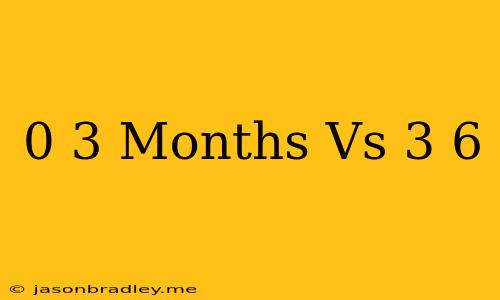0-3 Months vs 3-6 Months: A Baby Development Milestone Guide
The first six months of a baby's life are a whirlwind of growth and change. Each month brings new milestones, abilities, and adorable moments. While every baby develops at their own pace, there are some general trends you can expect to see in the first six months. Here's a breakdown of the key differences between the 0-3 month and 3-6 month stages:
0-3 Months:
Physical Development:
- Newborn Reflexes: At this stage, your baby relies heavily on reflexes like sucking, grasping, and the Moro reflex (startle reflex).
- Head Control: Your little one will start to hold their head up briefly when lying on their tummy.
- Rolling: While not common at this age, some babies may start to roll from their back to their side.
Cognitive Development:
- Visual Development: Babies at this age are drawn to faces and bright colors.
- Sound Recognition: They can distinguish different sounds and respond to familiar voices.
- Learning: Your baby starts to learn through observation and interaction.
Social & Emotional Development:
- Social Smiles: Your baby will start to smile in response to faces and voices.
- Cooing and Gurgling: Your little one will communicate through these sounds.
- Attachment: Strong attachment bonds form between the baby and their primary caregivers.
3-6 Months:
Physical Development:
- Rolling: Your baby will become proficient at rolling over in both directions.
- Sitting: They'll start to sit with support, and eventually, they'll be able to sit upright for short periods.
- Reaching and Grasping: Babies at this stage will reach for objects and show a strong desire to grab them.
Cognitive Development:
- Object Permanence: Your baby will understand that objects still exist even when they can't see them.
- Cause and Effect: They'll start to understand that their actions have consequences.
- More Complex Sounds: Babies will begin to babble and experiment with different sounds.
Social & Emotional Development:
- Stranger Anxiety: Some babies may develop a fear of unfamiliar people.
- Separation Anxiety: Your baby may cry when you leave the room.
- Social Interaction: They will engage more with other people and show clear signs of enjoyment during interaction.
Key Differences:
- Motor Skills: The most significant difference lies in motor development. Babies in the 3-6 month range develop much greater control over their bodies, allowing them to roll, sit, and grasp with increased confidence.
- Cognitive Abilities: The 3-6 month stage is marked by the emergence of object permanence, a crucial cognitive milestone that allows babies to understand the world around them in a more complex way.
- Social and Emotional Development: While the 0-3 month stage is focused on forming attachment bonds, the 3-6 month stage sees the development of social skills like stranger anxiety and separation anxiety, which are crucial for healthy social development.
Remember: Every baby develops at their own pace. Don't worry if your baby doesn't hit all the milestones exactly on time. If you have any concerns about your baby's development, talk to your pediatrician.
